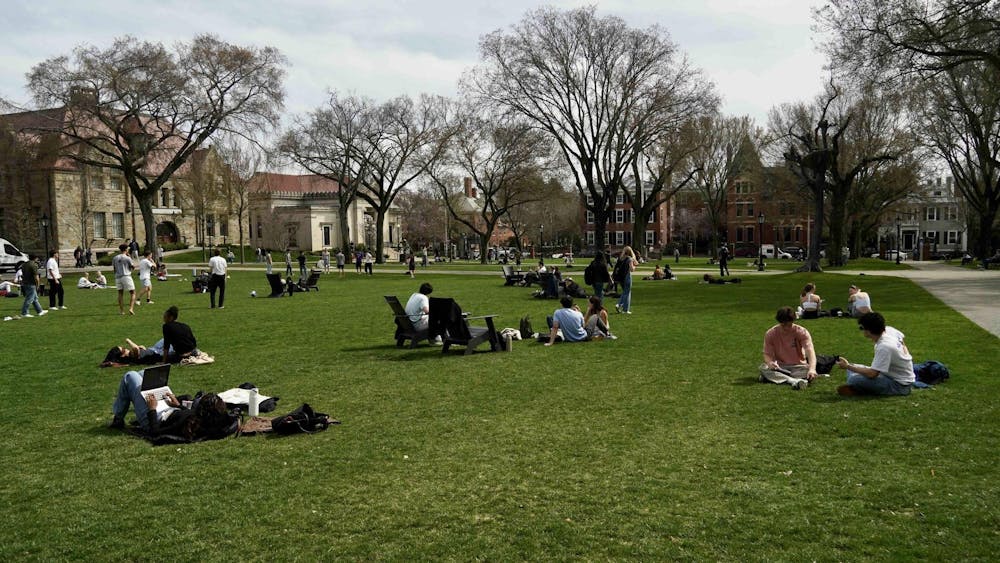Follow The Herald’s latest coverage on how the Trump administration is impacting Brown here.
Last Thursday evening, students across campus learned that the Trump administration plans to halt $510 million of federal funding to the University over alleged antisemitism on campus and diversity, equity and inclusion initiatives.
The planned funding freeze was confirmed by a White House official in an email to The Herald. As of around 5 p.m. Monday, the University had not yet received communication from the White House regarding the funding freeze, according to University Spokesperson Brian Clark.
The Herald spoke to 14 students about their initial reactions to the Trump administration’s actions and the University’s response thus far.
Surprised, but not shocked: The Trump administration’s planned funding freeze
For some students, the possible federal funding freeze came as a surprise.
Raima Islam ’25 found the news of the freeze to be “jarring.” In the past few weeks, she had read news reports of cuts to other universities, but did not think Brown would face the same fate.
Bluse Yuan GS said he was surprised — “but not so surprised,” he added — to hear about the planned freeze.
“As a foreign student, I feel concerned about what the president will do,” Yuan said, referring to President Trump.
Given that Brown’s endowment is the smallest of any Ivy League institution, Deeya Prakash ’26 said the scale of the planned funding freeze was “out of left field.”
“I’m very unsure about why our school specifically is targeted with this much money, knowing that it’s not as well-funded as the other universities,” she said.
While some students expressed surprise at the news, others said they anticipated the federal funding freeze. “I feel like we’re not immune to that feeling of elitism that I think the Trump administration is going after in academia,” Roshan Parikh ’24 GS said.
Amber Zhao ’27 — a current designer for post- Magazine — said she was not really surprised, calling the freeze “inevitable.”
“We have a large population of students who are really opposed to the Trump administration and what they’re doing,” Zhao said.
Some students expressed concerns that, like at Columbia, Brown’s leadership would agree to the terms set by the Trump administration in order to restore funding.
At Columbia, the Trump administration halted $400 million in federal funding in early March. In order to reopen negotiations to restore their funding, Columbia agreed to ban masks on campus, implement additional restrictions on protests and move a department out of faculty control, among other changes. All of these concessions were requested by the Trump administration.
Sebasstian Adriano ’25 hopes the University will protect “the fundamental rights of the students here,” pointing to a petition currently circulating campus.
The petition, titled “Defend Academic Freedom at Brown University,” states that the undersigned community members stand with the University “against the Trump administration’s unprecedented and politically motivated attacks on institutions of higher education in the United States.”
“We refuse to allow external political pressures to dictate what can and cannot be taught, researched or debated on our campus,” the petition reads.
Some students, like Karsen Chiminelli ’27, expressed concerns for the future of research at Brown. Chiminelli, who is involved in two labs, was unsure how the University could possibly respond to the Trump administration.
“Funding is being cut for so many undergraduates, graduate students and PhD students who are doing incredible work in terms of scientific advancement,” Hannah Chen ’27 said.
“I’m worried about our future as a research institution,” Dane Elliott ’25.5 added.
Elliott, who is a statistics concentrator, was hoping to participate in data science research in the public health field before graduating. But he no longer knows “how feasible it is for me to do research or get compensated for it,” he told The Herald.
As a member of the undocumented, first-generation college and low-income community on campus, more commonly known as U-FLi, Angel Romero ’25 said he particularly wants to know how need-based financial aid will be affected. He also hopes for open communication between students and the University administration, noting that office hours where students can ask questions about the funding freeze could be beneficial.
Gillian Foo GS said this spring is “a very, very bad time to graduate,” given the funding freezes across higher education. She added that this issue is likely going to “snowball into a backlog for the next few years.”
“It’s bleak for people trying to get into academia and people also already in academia,” Foo said. “I don’t know what’s worse, honestly.”
The University’s response — or lack thereof
Since the news broke on Thursday evening, students have yet to hear from the University administration directly.
“The federal government has not been in touch with Brown directly in regard to what’s being reported,” Clark wrote in an email to The Herald around 5 p.m. Monday. “We are closely monitoring notifications related to grants, but at a point when we have received no direct information or indication of any kind, there’s nothing more we can share.”
Hannah Chen said she is not too worried about the University’s lack of public response, given that the news broke only a few days ago. She added that she understands the University will have to wait to hear from the White House before responding.
Deeya Prakash “can’t imagine what’s going on behind the scenes,” she told The Herald. While she said that communicating with students is likely a priority for Brown’s administration, she did not think it would necessarily be their first action item.
“If anything, I understand what kind of chaos must be ensuing,” Prakash added.
“If I were Brown, I also wouldn’t really know how to respond,” Sophia Janssens ’27 told The Herald. “While I would love for Brown to be like, ‘No, we are going to stick with our diversity, equity and inclusion initiatives and the way that we do things here,’ I also think that it’s an incredibly precarious thing.”
But some students want the University to provide more insight.
“I think it’s really disappointing that we haven’t heard more from the University, because $510 million is such a sizable sum that will definitely have an impact on every single person here,” said Jessica Weissman ’28.
In the absence of a University response, “it’s hard for students to have confidence in their leadership,” Weissman added.
Roshan Parikh and Raima Islam both said that, given the significant concern among many students, they were disappointed in the lack of response from the University.
“I think a lot of students are feeling very unprotected, especially international students,” Islam said.
Amber Zhao told The Herald that she’s “looking out for (President Paxson’s) email.”
Prakash expressed a similar sentiment, noting that “as soon as we understand what this means for us … I will probably feel a little bit less panicked than I am now.”
As a graduating senior, Cole Griscom ’25 feels like he has “a little less stake in the game.”
“I’m jumping ship, so I don’t really have too much to lose,” Griscom said, though he expressed curiosity at what, exactly, the federal government would target at Brown.
Despite the uncertainty, some students remain hopeful.
“I’m sure everything will work out. I do have confidence in our administration,” Dane Elliot said. “This is a massive hurdle that we have to work through.”

Annika Singh is a senior staff writer from Singapore who enjoys rewatching Succession and cheating on the NYT crossword.

Ian Ritter is a senior staff writer covering graduate schools and students. He is a sophomore from New Jersey studying Chemistry and International and Public Affairs. When he’s not at the Herald, you can find him playing clarinet or explaining the rules of kickball to confused listeners.

Sophia Wotman is a University news editor covering activism and affinity & identity. She is a junior from Long Island, New York concentrating in Political Science with a focus on women’s rights. She is a jazz trumpet player, and often performs on campus and around Providence.





